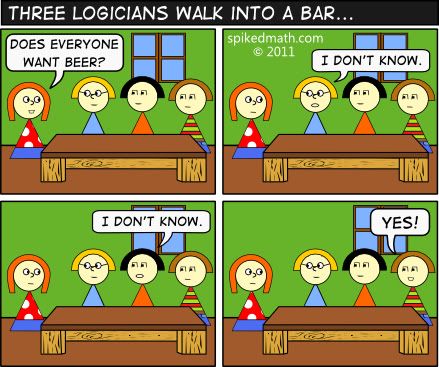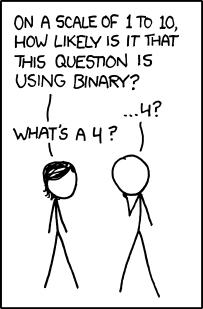
Get it?
Don

Interesting.
Even if the first one had wanted a beer, he answered I don't know because he doesn't know what the other two will say.
The second has seen the first one answer (I don't know), so even if he wants a beer he has to answer I don't know, because of the first answer and not knowing what the third answer will be.
So I am surprised at the third answer being yes. Even if he wants a beer, he has seen that the first two answers were I don't know. Therefore the answer should have been NO.
> So I am surprised at the third answer being yes. Even if he wants a beer, he has seen that the first two answers were I don't know. Therefore the answer should have been NO.
The waitress asked if everyone wanted a beer. the first would have said "no" if he didn't want one answering the question does EVERYONE want a beer. same with #2. the third seeing that the first two didn't answer no can assume they did want a beer and since he did also he answered yes.
> Get it?
I don't know.
:beer:
Two negatives make a positive. Math
jud
> Two negatives make a positive. Math
> jud
NO, would be a negative.
I don't see any negatives.
I don't know is an ambiguity.
2 ambiguities makes a double ambiguity.
the third seeing that the first two didn't answer no can assume they did want a beer and since he did also he answered yes.
That's just an assumption.
> the third seeing that the first two didn't answer no can assume they did want a beer and since he did also he answered yes.
>
> That's just an assumption.
No. The cartoon is a logic problem. I should not have said "assumed", the 3rd guy knew it.
The waitress asked if EVERYONE wants a beer. If 1 didn't want a beer he would have said "no." Therefore he DID want a beer, but didn't know what the others wanted.
The 2nd guy wanted a beer - otherwise he would have said "no" - but still didn't know what the 3rd guy wanted.
The 3rd guy, by the logic of the answers given before him, knew the others wanted a beer (since neither said "no") and did also.
You could also insert southern baptists in the same scenario!
rawful
OK, I concede.
NOW I need a beer!
:beer:
Don't you hate it when you have to explain a joke? I would have thought surveyors of all people would have gotten it right away.
Both were very good.
Now prove that 1 = 2.
Showed this to youngest file - 16 year old- aka known as the jailhouse lawyer. She had the right answer in 45 seconds +/- .04
There's three kinds of people......
Those that understand math and those that don't.
Back to the O.P.
When people reply "I don't know" when asked if they want a beer; you can safely assume that they want one.
Let A = any arbitrary number
Let B = A the same number
multiply both sides by the same quantity, A
AB = A^2
Subtract B^2 from both sides
AB-B^2 = A^2 - B^2
factor each side
B(A-B) = (A+B)(A-B)
divide out the common term
B = (A+B)
Substitute using original identity A=B
B =2B
Divide out the B
1 = 2
Q.E.D.
I still remember this one and didn't have to look anything up.
I considered that also. Problem is the one asking the question. She didn't say "I don't know if I want a beer, does everyone else?" She also didn't say "do all of you want a beer?" So, we're still left with an unknown quantity that we are assuming something about. We have to assume that "everyone" is not really everyone, but only those in a certain class; the seated at table.
This makes it an exclusionary joke with stereotypical overtones directed at those who choose to sit (must be a drunk unless you're up moving around). Thereby probably rendering it unfit for general distribution to this politically correct audience. Another good example of the lack of social skills of the mathematically inclined:) And another three innocents condemned by the lawyer on misinterpreted testimony and circumstantial evidence:)
Very good. That really disturbs people who don't understand much about algebra.
> This makes it an exclusionary joke with stereotypical overtones directed at those who choose to sit
Speaking of...
Know what a Surveyor does when he is constipated???
Works it out with a pencil. 😉
"B(A-B) = (A+B)(A-B)
divide out the common term
B = (A+B)"
Buzzzzzzzz!
Since A=B (see beginning hypothesis), (A-B)=0. You just divided by 0 and that is not allowed.
Or as Wikipedia says, "the expression has no meaning, as there is no number which, multiplied by 0, gives a (a?0)."



